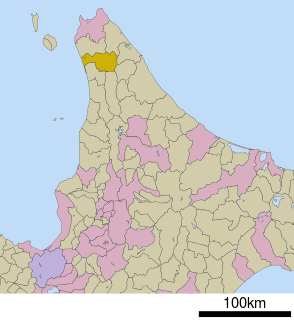Related Research Articles

Horonobe-cho is a town located in Sōya Subprefecture, Hokkaido, Japan. There is a JR train station, Horonobe Station which connects Horonobe-town with other cities in Hokkaido.
Maritalea is a genus of Gram-negative, strictly aerobic, oxidase- and catalase-positive, rod-shaped, motile bacteria with peritrichous flagella from the family of Hyphomicrobiaceae.
Maritalea mobilis is a Gram-negative, non-spore-forming bacterium from the genus of Maritalea with a single polar flagellum, which was isolated from coastal seawater in Tianjin in China. Zhangella mobilis was transferred to Maritalea mobilis
Maritalea porphyrae is a Gram-negative, aerobic, motile bacterium from the genus of Maritalea which was isolated from the alga Porphyra yezoensis.
Nocardioides fonticola is a Gram-positive and rod-shaped bacterium from the genus of Nocardioides which has been isolated from a freshwater spring in Kaohsiung on Taiwan.
Nocardioides marinquilinus is a Gram-positive, strictly aerobic, non-spore-forming, short rod-shaped and non-motile bacterium from the genus of Nocardioides which has been isolated from coastal seawater in Korea.
Nocardioides panacisoli is a Gram-positive, non-spore-forming and rod-shaped bacterium from the genus of Nocardioides which has been isolated from soil from a ginseng field in Pocheon in Korea.
Nocardioides salarius is a bacterium from the genus of Nocardioides which has been isolated from zooplankton from the South Sea near Korea.
Nocardioides salsibiostraticola is a Gram-positive, aerobic, non-spore-forming and non-motile bacterium from the genus of Nocardioides which has been isolated from biofilm from coastal seawater from the Norwegian Sea.
Hymenobacter saemangeumensis is a Gram-negative, extremely halophilic and non-motile bacterium from the genus of Hymenobacter which has been isolated from a salt mine in Wensu County in China.
Hymenobacter yonginensis is a non-motile bacterium from the genus of Hymenobacter which has been isolated from a mesotrophic lake near the campus of Hankuk University of Foreign Studies in Yongin in Korea.
Altererythrobacter troitsensis is a Gram-negative, aerobic, halotolerant, rod-shaped and motile bacterium from the genus of Altererythrobacter which has been isolated from the sea urchin Strongylocentrotus intermedius.
Mucilaginibacter daejeonensis is a Gram-negative, facultatively aerobic, heterotrophic, non-spore-forming, rod-shaped and non-motile bacterium from the genus of Mucilaginibacter which has been isolated from a dried rice straw.
Parapedobacter koreensis is a Gram-negative, non-spore-forming, rod-shaped and non-motile bacterium from the genus of Parapedobacter which has been isolated from dried rice straw.
Sphingobacterium wenxiniae is a Gram-negative, non-spore-forming bacterium from the genus of Sphingobacterium which has b een isolated from activated sludge from a wastewater treatment plant in China. Sphingobacterium wenxiniae has the ability to degrade cypermethrin.
Ponticoccus litoralis is a Gram-negative and strictly aerobic bacterium from the genus Ponticoccus which has been isolated from coastal seawater from Busan on Korea.
Terribacillus goriensis is a Gram-positive, moderately halotolerant, strictly aerobic, rod-shaped and motile bacterium from the genus of Terribacillus which has been isolated from sea water from Busan in Korea.
Gemmobacter fontiphilus is a Gram-negative, rod-shaped, non-spore-forming, facultatively anaerobic and non-motile bacterium from the genus of Gemmobacter which has been isolated from a freshwater spring from Taiwan.
Pelagicola litoralis is a Gram-negative, strictly aerobic and non-motile bacterium from the genus of Pelagicola which has been isolated from coastal water from the Sea of Japan from Korea.
Planktotalea is a genus of bacteria from the family of Rhodobacteraceae.
References
- ↑ Parte, A.C. "Maritalea". LPSN .
- ↑ "Maritalea myrionectae Taxon Passport - StrainInfo". www.straininfo.net.
- ↑ "Maritalea myrionectae". www.uniprot.org.
- ↑ Hwang, C. Y.; Cho, K. D.; Yih, W; Cho, B. C. (2009). "Maritalea myrionectae gen. nov., sp. nov., isolated from a culture of the marine ciliate Myrionecta rubra". International Journal of Systematic and Evolutionary Microbiology. 59 (Pt 3): 609–14. doi: 10.1099/ijs.0.002881-0 . PMID 19244448.
- ↑ Deutsche Sammlung von Mikroorganismen und Zellkulturen